| Srl | Item |
| 1 |
ID:
148938
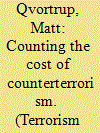

|
|
|
| 2 |
ID:
126018
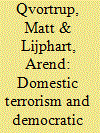

|
|
|
|
|
| Publication |
2013.
|
| Summary/Abstract |
Using logistic regression on the 36 democracies studied in Lijphart's Patterns of Democracy, we find statistically significant correlations between the index of consensus democracy and a higher incidence of fatal domestic terror incidents in the period 1985-2010. We further find that the risk of fatal terrorist attacks is almost six times higher in majoritarian democracies than in their consensus counterparts, and that this indicator is stronger than factors such as economic development and a large youth population and levels of urbanisation.
|
|
|
|
|
|
|
|
|
|
|
|
|
|
|
|
| 3 |
ID:
111579
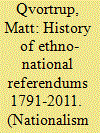

|
|
|
|
|
| Publication |
2012.
|
| Summary/Abstract |
This article presents an overview of the total number of ethno-national referendums since the French Revolution to the present day. After establishing a typology of referendums, the article goes on to present the trends in their use from the beginning of the eighteenth century to the present day. While referendums are said to be about democratic legitimacy and idealistic principles, the history suggest that short- and long-term political calculations have been the main motivations for holding them and that their overall number have grown, especially in times of geopolitical upheaval.
|
|
|
|
|
|
|
|
|
|
|
|
|
|
|
|
| 4 |
ID:
158222
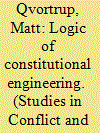

|
|
|
|
|
| Summary/Abstract |
Originally conceived by Aristotle and Thomas Hobbes, comparative constitutional engineering in its modern form is a relatively new field of political science. It is based on the premise that political behavior and policy outcomes can be affected and shaped by institutional design such as, above all, electoral systems. The article provides an overview of the empirical literature underlying this branch of institutional counterterrorism. The article presents the logic of constitutional engineering from its classical origins and especially through the work of Arend Lijphart. It is suggested that Lijphart provides a new paradigm in the sense employed by Thomas Kuhn. The article provides original research in support of this showing that the presence of consensus institutions has better explanatory value than most social factors.
|
|
|
|
|
|
|
|
|
|
|
|
|
|
|
|
| 5 |
ID:
175580
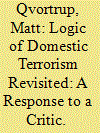

|
|
|
|
|
| Summary/Abstract |
The article responds to criticisms raised by Matthijs Bogaards. While he makes a number of valid methodological points, it is maintained that the Qvortrup–Lijphart Model of Domestic Terrorism remains paradigmatic. Part of the criticism seems to be based on a misunderstanding of the requirement that causal theories should be as parsimonious as possible. Further, Bogaards does not provide an alternative that both accounts for the occurrences explained by the model as well as the issues that were explained by it (as is required by falsificationist methodological rules). In short, the theory that institutions can contribute to limiting the occurrence of domestic terrorism remains strong, at least in developed capitalist societies. There is no viable alternative; opportunities for democratic engagement are a potent force against political violence.
|
|
|
|
|
|
|
|
|
|
|
|
|
|
|
|
| 6 |
ID:
086974
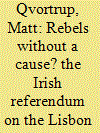

|
|
|
|
|
| Publication |
2009.
|
| Summary/Abstract |
The Irish referendum on the Lisbon Treaty follows a pattern of class-voting also seen in the 2005 referendums on the European Constitution. However, the poll differed in other respects. Polling in the wake of the vote suggested that the main reason given for voting no was a lack of knowledge about the treaty (22 per cent of no voters holding that view). A further 40 per cent of the voters voted no because they claimed not to understand the Treaty. This is in contrast to referendums in 2005 in Spain and the Netherlands where, respectively 70 and 51 per cent, of those with a self confessed 'very limited ' knowledge of the Constitution voted yes.
|
|
|
|
|
|
|
|
|
|
|
|
|
|
|
|
| 7 |
ID:
130951
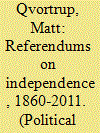

|
|
|
|
|
| Publication |
2014.
|
| Summary/Abstract |
There have been more than 50 independence referendums since the middle of the 19th Century when Texas, Virginia and Tennessee-albeit unsuccessfully-voted to leave the USA. A handful of plebiscites were held in each decade after 1945, but most independence referendums were held after the break-down of communism. Most have resulted in majorities for independence. However, such plebiscites have been rare in countries with established systems of democratic government and the results may not be a fair reflection of the views of the voters. When referendums have been held in democratic countries, they have often resulted in a no-vote (though Montenegro is an exception to the rule). Referendums have on a few occasions resulted in the exacerbation of ethnic conflict, such as in Bosnia-Herzegovina and in East Timor. But generally speaking referendums are not correlated with civil war; indeed, war resulted in only 13 percent of the cases.
|
|
|
|
|
|
|
|
|
|
|
|
|
|
|
|
| 8 |
ID:
144834
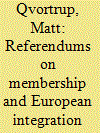

|
|
|
|
|
| Summary/Abstract |
There are many myths about referendums. The most common one is that voters are inherently sceptical and tend to vote no when given the opportunity. This article analyses some of the commonly held ‘truths’ about referendums on EU matters. Based on a statistical analysis of all forty-three EU-related referendums since 1972, it shows that governments tend to lose referendums if they have been in office for a long time, that emotive words on the ballot paper are correlated with a high yes vote and that a high turnout is correlated with a vote against European integration, but campaign spending is inconsequential. Based solely on statistical evidence from the previous forty-three referendums, the opponents of EU membership will win the Brexit referendum.
|
|
|
|
|
|
|
|
|
|
|
|
|
|
|
|
| 9 |
ID:
111572
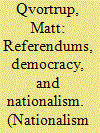

|
|
|
| 10 |
ID:
070826
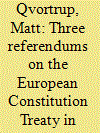

|
|
|
| 11 |
ID:
137795
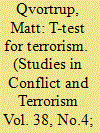

|
|
|
|
|
| Summary/Abstract |
Can electoral reform lead to a reduction in the number of terrorist incidents? Economists have shown that the introduction of constitutional institutions such as courts in the early eighteenth century had a direct effect on investment. Could there be a similar link between the introduction of proportional representation (PR) electoral systems and a reduction in the number of terrorist attacks? Previous studies using cross-sectional data have found a negative correlation between the presence of PR-electoral systems and the number of terrorist incidents. However, earlier studies were based on aggregate figures, not on time-series data. They did not provide a direction that could be used to measure the possible effect of the introduction of PR. This research note addresses this problem. Using a paired samples t-test it is possible to show that the introduction of proportional representation in Northern Ireland and Algeria led to a marked reduction in the number of terrorist attacks. The note thus adds strength to earlier studies.
|
|
|
|
|
|
|
|
|
|
|
|
|
|
|
|
| 12 |
ID:
111661
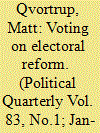

|
|
|
|
|
| Publication |
2012.
|
| Summary/Abstract |
Referendums on electoral systems are relatively rare. In most countries changes to the electoral system are enacted through the legislatures. The British referendum in May 2011 is thus one of the rare examples. In this article it is shown that the apparently idiosyncratic factors in the referendum were consistent with general trends identified in other referendums. While the media focused on the harshness of the campaign, the referendum also resulted in surprising coalitions between long-term foes, thus suggesting that the referendum contributed to cross-party cooperation rarely seen in a majoritarian system like that of Great Britain.
|
|
|
|
|
|
|
|
|
|
|
|
|
|
|
|